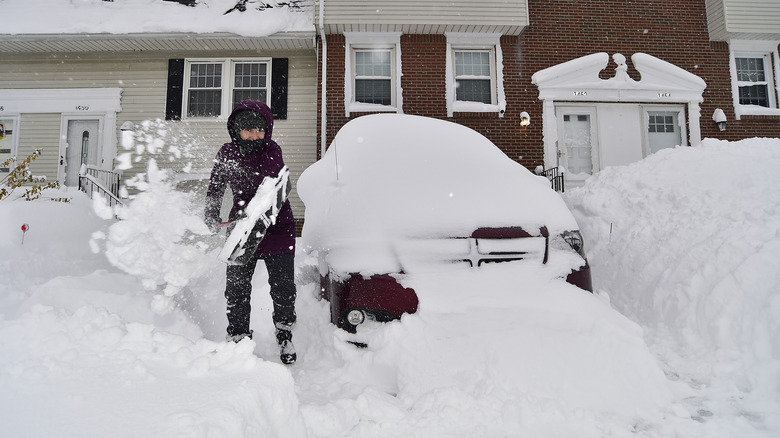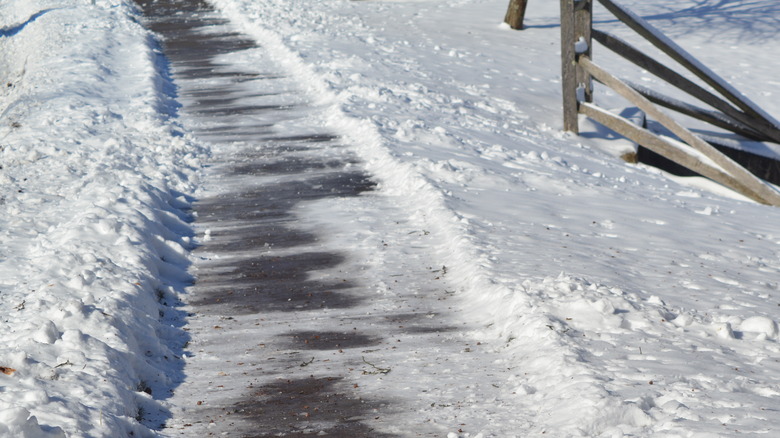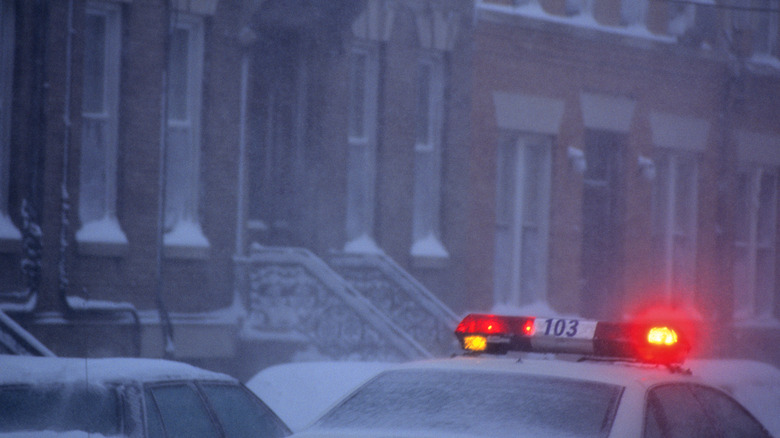Winter Is Coming: Not Shoveling Your Snow Could Leave You With A Hefty Fine
There are those rare few who enjoy winter chores (this writer included), but it's a safe bet that many who live in northern climes don't relish the to-do list that comes with snow storms. It's a road hazard, it's cold and wet when it soaks through your layers, and if the snow is deep and heavy enough, it can be backbreaking work to dig your house and car out from under it. With all that hassle, it's tempting to leave the white stuff where it is and enjoy the view of pristine snow through the window of a comfortably-heated home. Nearly a quarter of Americans are expected to be working remotely by 2025 anyway (per USA Today) — what's the hurry to get the driveway clear?
But the pavement outside your window likely includes a piece of public sidewalk, and those inclined toward a laissez-faire attitude toward driveway care in wintertime should probably check on what their state says about such public spaces. Not every state has a law about snow removal; where it's rare or nonexistent, there'd be little point in such regulations. But many states, or major cities within states, have measures on the books requiring landlords and homeowners to do something about snow on public pavement. Failure to comply can end up costing you — literally. So before you let the sun take care of your pavement the way it might take care of interior heating, you may want to check out these state and local laws on snow clearance.
Homeowners, landlords, and businesses are all compelled to clear snow
Public sidewalks and walkways aren't just found on either side of a suburban street. They're found outside businesses, museums, government buildings — all over the place. And those states with laws about snow removal compel its speedy removal from such public spaces. This isn't just to improve the flow of foot traffic. As pretty as snow and ice are, they can be a safety hazard. Leaving it be in the middle of winter increases the risk of slipping, falling, and sustaining serious injury.
State laws aim to prevent that. The Alaska Landlord Tenant Act (via the Alaska State Court Library) requires landlords to remove snow from "common areas," a responsibility specifically assigned to them (the law allows landlords to pass responsibility for removing snow from non-public "leased premises" to tenants). Colorado has a similar law aimed at the owner of any building or store. Indiana, Nevada, New York, and other states all have general ordinances requiring owners of businesses and residential buildings to remove snow.
Other states go further, regulating where snow can be put once cleared. The Michigan Vehicle Code (via Scott Goodwin Law) forbids "obstruct[ing] safety vision by removal or deposit of snow, ice, or slush." In other words, if you clear the walkways around your building in a way that impairs drivers' vision on the road or in a driveway, you're doing it wrong. And you can end up paying up to $100 for it.
Penalties and enforcement of snow removal laws vary
The penalties for non-compliance with snow removal laws vary state to state, and across cities that have ordinances of their own. Omaha, Nebraska will charge residents up to $200 if they don't get sidewalks cleared within 24 hours of city ploughs clearing the streets. Salt Lake City has fines ranging from $50 to $200, depending on how much time has passed since a snowfall and the length of your property adjacent to the street (per the city's government website). Philadelphia has a fee of $50.
But figures on paper don't matter much if no one's held to account for breaking the laws they're attached to. Indianapolis, Indiana has a law on the books requiring residents and business owners to clear the sidewalks after it snows, with a penalty of $50 for noncompliance, but WRTV Indianapolis reports that it's almost never enforced. In other cases, the law itself can be vague. The City of Madison, Wisconsin requires sidewalks to be cleared by noon after snow stops falling, but their website says only that those who fail to do so "may [be] issue[d]...a citation with a fine." The amount the fine may be is unstated.
The same site also says that no warnings will precede a citation, due to the safety hazards posed by not clearing sidewalks. And the mayor's office in Indianapolis framed snow-clearing measures as a matter of civic duty, a shared responsibility to improve public safety, than a legal box to check off.


